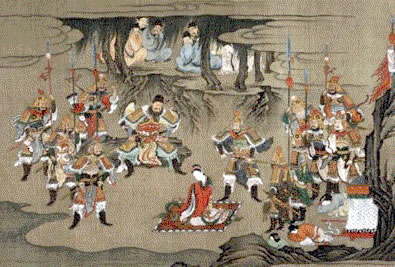Summary |
要約 |
>Top
0. Prologue:
- Yáng Guìfēi (719-756): born Yáng Yùhuán, was a consort of Emperor Xuan-Zong
of Táng Dynasty of China.
|
0.プロローグ:
- 685-762: 玄宗(Xuan-Zong) 皇帝
- 719-756: 楊貴妃、本名楊玉環
- 安史の乱(755) により逃亡の途中、反乱により楊国忠、楊貴妃他殺害
|
>Top
1. Everlasting regret (1) - Bai Juyi: Femme
fatale
- The emperor of Hàn Dynasty has pursued a peerless beauty.
- During the long reign he has made a vain attempt to find one.
- There was a girl (later named as Yáng Guìfēi) who grew up in Yáng
family.
- She was brought up with tender care in a good family and had not
widely known.
- Her innate beauty couldn't become unknown to the public.
- One day she was known to be the emperor and was called.
- Once she began to look around and smiles, then her charm appealed
everyone.
- Then all the beauties of the palace had withered into insignificance.
|
1. 長恨歌(1) - 白居易 (772-846):
長恨歌 白居易
Cháng Hèngē Bái jūyì
- 漢皇重色思傾国
Hànhuáng zhòngsè sīqīngguó
- 御宇多年求不得
yùyǔ duōnián qiúbude
- 楊家有女初長成
Yángjiā yǒunǚ chūzhǎngchéng
- 養在深閨人未識
yǎngzài shēnguī rénwèishí
- 天生麗質難自棄
tiānshēng lìzhì nánzìqì
- 一朝選在君王側
yīzhāo zuǎnzhài jūnwángcè
- 廻眸一笑百媚生
huímóu yíxiào bǎimèi shēng
- 六宮粉黛無顔色
liùgōng fěndài múyánsè
|
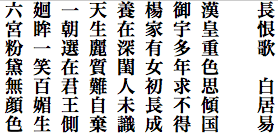
- 漢皇色を重んじ傾国を思ふ
- 御宇多年求むれども得ず
- 楊家に女有り初めて長成す
- 養はれて深閨に在り人夫だ識らず
- 天質の麗質自ら棄て難し
- 一朝選ばれて君主の側に在り
- 眸を迴らして一笑すれば百媚生じ
- 六宮の粉黛顔色無し
|
>Top 2. Hot spring at
Hua Quing Chi:
- She had an opportunity to have a bath at in Huá Qīng Chí.
- Hot spring water which washed out her delicate skin was smooth.
- The lady's maids assisted her to stand up but her airy-fairy body
couldn't sustain by herself.
- This was her first gain of the favor of the emperor.
- Her tufty long hair, floral face and swaying ornament added her
charm.
- The curtain of lotus keeps warm nights in spring.
- The emperor got up late regretting short night in spring.
- Since then he woudn't administer the affairs of state.
|
2. 長恨歌(2) - 白居易:
- 春寒賜浴華清池
chūnhán cìyù Huáqīngchí
- 温泉水滑洗凝脂
wénquán shuǐhuá xǐ níngzhī
- 侍児扶起嬌無力
shìér fúqǐ jiāo wúlì
- 始是新承恩沢時
shǐshì
xīnchéng ēnzéshí
- 雲鬢 花顔 金歩揺
yúnbìn
huāyán jīnbùyáo
- 芙蓉帳暖度春宵
fúróng zhàngnuǎn dù chūnxiāo
- 春宵苦短日高起
chūnxiāo kǔduǎn
rìgāoqǐ
- 従此君主不早朝
cóngcǐ jūnzhǔ bùzhǎocháo
|
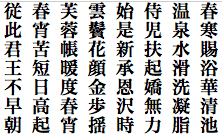
- 春寒うして浴を賜ふ華清池
- 温泉水滑らかにして凝脂を洗ふ
- 侍児扶け起こせば矯として力無く
- 始めて是れ新たに恩沢を承くるの時
- 雲鬢花顔金歩揺
- 芙蓉の帳暖かにして春宵を度る
- 春宵短きを苦しみ日高くして起く
- 此れより 君主早朝せず
|
>Top 3. The glory of Yang:
- Yang Guifei paid court to the emperor, always attending the party
together without a break.
- In daytime attending spring party, and also in night she continued
to receive all attention from him.
- There were 3,000 beauties in the harem.
- All the emperor's affection concentrated to her.
- Yang Guifei could live in a golden palace, and attended night
party wearing careful makeup.
- After attending the party at stately mansion, they felt an aura
of spring.
- All relatives of Yang Guifei were raised to the peerage.
- The glory was just shining on the clan of Yang.
- At last all the people consider themselves that
- Having a girl is more important than having a boy.
|
3.
長恨歌(3) - 白居易:
- 承歓待宴無閑暇
chénghuān
dàiyàn wúxiánxiá
- 春従春遊夜専夜
chūn
cóngchūnyóu yè zhuānyè
- 後宮佳麗三千人
hòugōng jiālì sānqiānrén
- 三千寵愛在一身
sānqiān chǒngài zàiyīshēn
- 金屋粧成嬌侍夜
jīnwū zhuāngchéng jiāoshìyè
- 玉楼宴罷酔和春
yùlóuyàn bà zuì héchūn
- 姉妹弟兄皆列士
jiěmèi dìxiōng jiē lièshì
- 可憐光彩生門戸
kělián guāngcǎi shēng ménhù
- 遂令天下父母心
suílíng
tiānxià fùmǔxīn
- 不重生男重生女
búzhōng shēngnán zhōng shēngnǚ
|
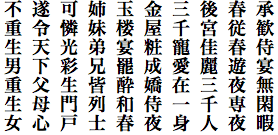
- 歓を承け宴に侍して閑暇無く
- 春は春遊に従ひ夜は夜を専らにす
- 後宮の佳麗三千人
- 三千の寵愛一身に在り
- 金屋粧ひ成って嬌嬌として夜に侍し
- 玉楼宴罷んで酔うて春に和す
- 憐むべし光彩の門戸に生ずるを
- 遂に天下の父母の心をして
- 男を生むを重んぜず女を生むを重んぜしむ
|
>Top 4. Attacking drum:
- The palace was located on a hill and soared to the sky.
- Courtly music was heard everywhere.
- Slow tempo and elegant dance harmonized with orchestra music.
- The emperor enjoyed wearilessly all day long.
- Suddenly there came an attacking sound of drum shaking the ground.
- It surprised and shook up the mind of entertainment.
- The palace was covered by dust.
- The emperor attempted to evacuate with ten thousand of troops
south-westward.
|
4. 長恨歌(4) - 白居易:
- 驪宮高処入青雲
lígōng gāochǔ rù qīngyún
- 仙薬風飄処処聞
xiānyào fēngpiāo chǔchǔ wén
- 綾歌慢舞凝糸竹
línggē mànwǔ níng sī zhú
- 尽日君主看不足
jǐnrì jūnzhǔ kān bùzú
- 漁陽鼙鼓動地来
yúyáng pígǔ dì lái
- 驚破霓裳羽衣曲
jīngpò nícháng yǔyī qū
- 九重城闕煙塵生
jiǔchóng
chéngquè yānchén shēng
- 千乗万騎西南行
qiānchéng mòqí xīnán
háng
|
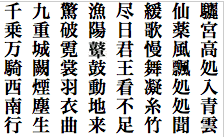
- 驪宮高き処青雲に入り
- 仙薬風に瓢りて処処に聞こゆ
- 綾歌慢舞糸竹を凝らし
- 尽日君主看れども足らず
- 漁陽の鼙鼓地を動かして来り
- 驚破霓裳羽衣の曲
- 九重の城闕煙塵生じ
- 千葉万騎西南に行く
|
>Top 5. Sorrow for
Yang Guifei:
- The imperial standard proceeded to and fro.
- They proceeded a hundred miles from the gate of capital Chang-An.
- At last the troop rejected to proceed any more.
- Yang Guifei was suffered the extreme penalty
due to the revolt.
- The decoration tumbled off her head, which nobody would pick it
up.
- Her hair ornament and coiffure were too.
- Even the emperor could not help her.
- Only he was shedding bitter tears.
|
5. 長恨歌(5) - 白居易:
- 翠華揺揺行復止
suìhuā yáoyáo hángfùzhǐ
- 西出都問百余里
xīchū dōuwèn bǎiyúlǐ
- 六軍不発無奈何
liùjūn bùfā wúnàihé
- 宛転蛾眉馬前死
wǎnzhuǎn éméi mǎqián sǐ
- 花細委地無人収
huāxì wěi dì wúrén shōu
- 翠翹金雀玉掻頭
suíqiáo
jīnqiāo yù sāotóu
- 君主俺面救不得
jūnzhǔ yǎnmiàn jiù bude
- 廻首血涙相和流
huíshǒu xiělèi xiānghé liú
|
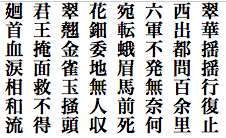
- 翠華揺揺として行きて復た止り
- 西のかた部門を出づること百余里
- 六軍発せず奈何ともする無く
- 宛転たる蛾眉房前に死す
- 花鉗は地に委てられて人の収むる無く
- 翠翹金雀玉掻頭
- 君主面を掩ひて救ひ得ず
- 首を廻らして血涙相如して流る
|
>Top 6. Sorrow for
Yang Guifei:
- Yellow dust closed down all around, and wind blew depressingly.
- The army climbed up to a tall cloud-capped tower.
- Few people could come to this remote E-Mei-Shan mountain.
- The imperial standard became faded and the light of the sum dimmed.
- Though the river looked dark green and the mountains blue in Shu
country.
- The emperor felt sorrow for Yang Guifei every morning and evening.
- The moon from the temporal palace reminded lament for the missing
consort.
- The sound of bell in a rainy night jogged the grief.
|
6.
長恨歌(6) - 白居易:
- 黄埃散漫風粛索
huáng āi sǎnmàn fēng sùsuǒ
- 雲桟榮紆登剣閣
yúnzhàn
róng yūedēng jiàngé
- 峨眉山下少人行
éméishān xià shǎorén xíng
- 旌旗無光日色薄
jīngqí wúguāng rìsè báo
- 蜀江水碧蜀山青
Shǔjiāngshuǐ bì Shǔshān qīng
- 聖主朝朝暮暮情
shèngzhǔ cháocháo mùmù
qíng
- 行宮見月傷心色
xínggōng jiànyuè
shāngxīn sè
- 夜雨聞鈴腸断声
yèyǔ wénlíng chángduàn
shēng
|
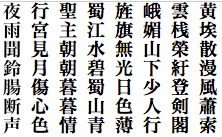
- 黄挨散漫風蕭索
- 雲桟榮紆剣閣に登る
- 峨帽山下人の行くこと少に
- 握旗光無く日色薄し
- 蜀江は水碧にして蜀山は青く
- 聖王朝朝暮暮の情
- 行宮に月を見れば傷心の色
- 夜雨に鈴を聞げば腸断の声
|
>Top 7. Return to Chang-An:
- The situation has changed, and the emperor reconvered the power
of the government.
- When he arrived at the place of the consort's death, he could
not leave.
- In the midst of this mud near the bank of Ma Wei
- This is the real place the beauty was killed in vain.
- Both the emperor and vassals shed tears making their clothes wet.
- They aimed at the gate of Chang-An depending on the horses' paces.
|
7. 長恨歌(7) - 白居易:
- 天旋地転廻竜馭
- 到此躊躇不能去
- 馬嵬坡下泥土中
mǎwéipō xià nítǔ zhōng
- 不見玉顔空死処
- 君臣相顧尽
|
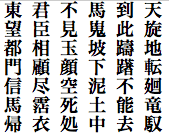
- 天旋り地転じて竜馭を週らし
- 此に到りて蹟路して去ること能はず
- 馬嵬坡の下泥土の中
- 玉顔を見ず空しく死せし処
- 君臣相顧みて尽く衣を露し
- 東のかた部門を望み馬に信せて帰る
|
>Top 8. The unchanged palace:
- The palace was unchanged including pond and garden.
- Lotus in the pond bloomed, and willow trees became green.
- All these things reminded him the dead consort.
- Whenever plums flowered in a spring night.
- Whenever leaves of paulownia fell in a autumn rain,
- When grass of garden grew thick
- Nobody cared to rake up the fallen leaves from stairs.
- The servants in the garden became older.
- Beauty of the maids in the palace faded.
|
8. 長恨歌(8) - 白居易:
|
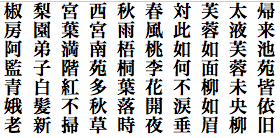
- 帰り来れば池苑皆旧に依る
- 太液の芙蓉未央の柳
- 芙蓉は面の如く柳は眉の如し
- 此に対して如何ぞ涙垂れざらん
- 春風桃李花開くの夜
- 秋雨梧桐葉落つるの時
- 西宮南苑秋草多く
- 宮葉階に満ちて紅掃ばず
- 梨園の弟子白髪新たに
- 椒房の阿監青蛾老いたり
|
>Top 9. Lonesome days:
- Looking at flying fireflies absently,
- Being awake until the last candle light.
- Night seemed much longer hearing sound of distant bells.
- Looking at the Milky Way, it was getting to dawn.
- How cold the duck-shaped tiles were covered by frost.
- How cold the feather quilt was without the partner.
- It passed years since we parted
- Even her soul couldn't appear in my dream.
|
9. 長恨歌(9) - 白居易:
|
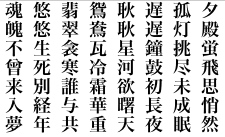
- 夕殿螢飛んで思ひ憤然
- 孤灯挑げ尽くして未だ眠りを成さず
- 遅達たる鐘鼓初めて長き夜
- 欺欺たる星河曙けんと欲するの天
- 鴛鳶の瓦冷やかにして霜華重く
- 輩翠の袋寒うして誰と共にかせん
- 悠悠たる生死別れて年を経るも
- 魂ぱく曾て来りて夢に入らず
|
>Top 10. A guru:
- A guru happened to be invited at Chang-An.
- He was believed to recall a soul of the dead.
- Sympathizing with the sleepless emperor
- The guru ordered disciples to find the soul of Yang Guifei.
- The disciples looked for up in the sky heaven, and
- They crept into the underground hell.
- But they couldn't find the soul anywhere.
|
10. 長恨歌(10) -
白居易:
|
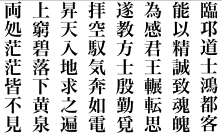
- 臨きょうの道士鴻都の客
- 能く精誠を以て魂魂を致す
- 君王展転の思ひに感ずるが為に
- 遂に力士をして慇懃にもとめしむ
- 空を排し気に馭して奔ること電のごとく
- 天に昇り地に入りて之を求むること遍し
- 上は碧落を窮め下は黄泉
- 両処茫々として皆見えず
|
>Top 11. A nymph named
Tai Zhen:
- There was a rumor of helmits-living mountain above sea.
- The mountain rose in spacious land.
- There was a tower finely decorated.
- There lived a number of nymphs there.
- One of them is named Tai Zhen.
- She resembled Yang Guifei with snowy white skin and flowery face.
|
11. 長恨歌(11) -
白居易:
|
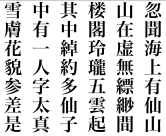
- 忽ち聞く海上に仙山有りと
- 山は虚無縹緲の間に在り
- 楼閣玲瀧として五雲起こり
- 其の中綽約として仙子多し
- 中に一人有り字は太真
- 雪の膚花の貌参差として是れなりと
|
>Top 12. Soul of Yang
Guifei:
- A disciple knocked the gem-made bolt of the golden tower.
- And asked a little agent to meet the nymph.
- Hearing a messenger's arrival from the emperor
- The soul of Yang Guifei waked up behind the screen.
- She looked for the clothes and ranged about.
- Various bead screens and silver panels were opened.
- Her hairs leaned slightly with just awaken face.
- She came down with improperly worn crown.
- Her fine sleeves whirled up by the wind.
- Those looked like a wind-blown robe of feathers.
- Her beautiful face looked sad with tears
- Just like a branch of pear flower wet in spring rain.
|
12.
長恨歌(12) - 白居易:
|
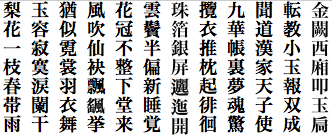
- 金闕の西廂に玉けいを叩き
- 転じて小玉をして双成に報ぜしむ
- 間道らく漢家天子の使なりと
- 九華の帳裏夢魂驚く
- 衣をとり枕を推し起ちて徘徊し
- 珠箔銀屏りいとして開く
- 雲曇半ば偏して新たに睡りより覚め
- 花冠整へず堂を下りて来たる
- 風は仙快を吹きて瓢ようとして挙がり
- 猶ほげい裳羽衣の舞に似たり
- 玉容寂寞として涙欄干
- 梨花一枝春雨を帯びたり
|
>Top 13. Split memorials:
- She expressed appreciation with emotions to the emperor
- His voice and figure had dimmed away since departure.
- Affection received at Zhao Yang Dian was disconnected.
- Long time had passed in this Peng Lai Gong.
- I tried to look down the living world.
- But could not find Chang-An, but a dense fog or dust.
- I would show my feelings by the memorial given to me.
- Asked the disciple to take a shell-made casket and a golden comb.
- But she wanted to leave a part of them.
- She tore apart a part of the comb and top of the box.
- Hoping to keep mutual hearts solid like this shell and gold.
- Someday we might meet again though we are separated in the different
worlds.
|
13.
長恨歌(13) - 白居易:
|
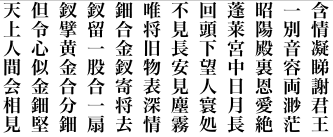
- 情を含みひとみ睇を凝らして君王に謝す
- 一別音容両つながら渺茫
- 昭陽殿裏恩愛絶え
- 蓬莱宮中日月長し
- 頭を廻して下人寰を望む処
- 長安を見ずして塵霧を見る
- 唯だ旧物を将って深情を表はさんと
- 鈿合金釵寄せ将って去らしむ
- 釵は一股を留め合は一扇
- 釵は黄金を擘き合は鈿を分かつ
- 但だ心をして金鈿の堅きに似しめば
- 天上人間会ず相見えんと
|
>Top 14. Eternal love:
- She asked the disciple to deliver her hearty message to the emperor.
- It included messages only the couple could understand.
- It was the reference to the night on July 7 at Chang Sheng Dian.
- In the sky they swore to become an imaginary bird with each eye
and each wing of male and female.
- On the earth they swore to become an imaginary tree combined with
each branch of male and female.
- And heartrending feeling would go on and unchanged forever.
|
14. 長恨歌(14) - 白居易:
|
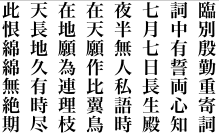
- 別れに臨みて慇懃に重ねて詞を寄す
- 詞中に誓有り両心のみ知る
- 七月七日長生殿
- 夜半人無く私語せし時
- 天に在りては願はくは比翼の鳥と作り
- 地に在りては願はくは連理の枝と為らんと
- 天長地久時有りて尽くるも
- 此の恨みは綿綿として絶ゆるの期無からん
|
